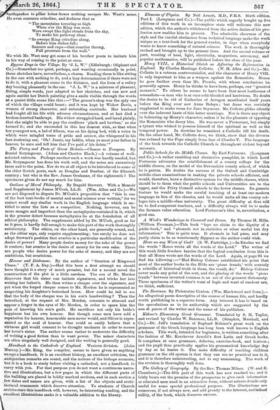Bygone Days in Our Village. By "J. L. W." (Edinburgh:
Oliphant and Co.)—Somewhat too quiet, perhaps, and wanting occasionally in point, these sketches have, nevertheless, a charm. Reading them is like sitting in the sun with nothing to do, and a lazy determination if there were not to do it, with a pleasant scene in the distance, and the hum of a sultry day buzzing pleasantly in the ear. "J. L. W." is a mistress of pleasant, fitting, simple words, just adapted to her sketches, and can now and again amidst her Dutch painting gives smile visible through the words M a quaint little scene like this :—" The grocer's shop was the only one of which the village could boast ; and it was kept by Widow Davis, a woman of strong character, and unbending rectitude. Her husband had fought all his life with adverse circumstances, and at last died a broken-hearted bankrupt. His widow struggled hard, and fared plainly, that she might be able to pay the creditors 'plack and bawbee,' as she termed it; and she succeeded in this her dearest wish, so that when her youngest son, a lad of fifteen, was on his dying bed, with a voice in which were mingled tones of pride and sorrow, she whispered in his fast deafening ear, 'Oh! Jamie, my laddie, when ye meet your father in heaven, be sure and tell him that I've paid a' his debts.'"






























 Previous page
Previous page